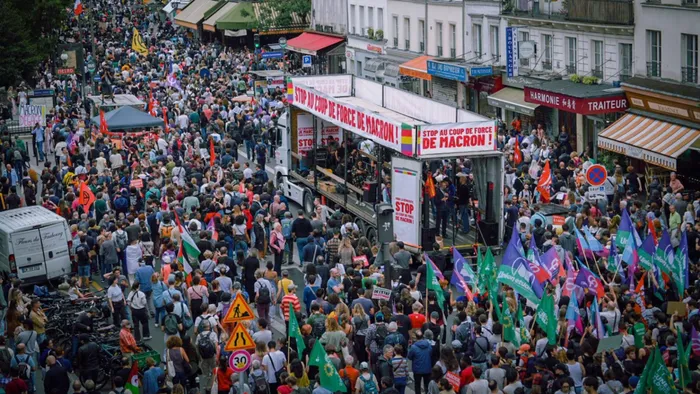Global rise of the right-wing reinforces legacies of slavery, colonialism

On Saturday, September 7, approximately 300,000 people took to the streets across France to protest President Emmanuel Macron’s appointment of conservative Michel Barnier as Prime Minister. The protests, led by left and progressive groups, reflect growing anger at Macron’s decision to bypass the election results and avoid a progressive government, amid the unprecedented rise of the right-wing in France and Europe on the whole. Picture: France Unbowed / X
By Reneva Fourie
“With most of the great national liberation struggles of the 20th century concluded, with the transnational and transracial unifying logic of Marxism pushed back by neo-liberal politics and economics, with the loss of the ideological cohesion and solidarity of the great struggles of the last century, individuals and communities have sought identity, belonging and cohesion in ancient, anachronistic bonds. Muslims have become more Muslim, Jews more Jewish, Christians more Christian, Zulus more Zulu.” (Barry Gilder, 2012).
The above quotation by Gilder (2012) underscores the fact that nature seldom leaves vacuums. The deliberate suppression of the hegemony of progressive voices in the public space is leading to a growth in narrow nationalism and anti-enlightenment sentiments. The trend is characterised by an excessive glorification of a national or cultural group, accompanied by polarised attitudes towards “the other” that border on hatred.
Countries in Europe are undergoing general elections. The outcomes of the elections to date, including the June European parliamentary elections, indicate a shift towards the Right. Most recently, in Germany, the extreme Right party, Alternative für Deutschland, won the Thuringia State elections for the first time since World War II.
The rise in support for extremist right-wing ideologies is alarming. Right-wing political parties are gaining momentum in elections through campaigns that exploit public concerns about unemployment, poverty, hunger and immigration while inciting hatred and exclusion in the process.
Additionally, several countries have witnessed politically- and anti-establishment-motivated violence stemming from the ideologies. Britain, for example, recently experienced riots by the far right in about 20 towns and cities, which were accompanied by the destruction of property and attacks on people, particularly Muslims.
While the two phenomena are distinct, it is important to note that there are various ways in which right-wing violence often intersects with conventional politics. Right-wing extremist groups and certain political factions might espouse similar rhetoric, which usually includes the undermining of established governance processes, concerns about the erosion of national identity, discrimination against ethnic and racial minorities and the entrenchment of patriarchal practices.
The intersecting ideologies could significantly affect social and political dynamics, leading to the oppression of those regarded as inferior or as a perceived threat and even genocide, as perpetrated by right-wing Zionists in Palestine.
The increasing prevalence of right-wing extremism can be attributed to several factors. The collapse of strong socialist states like the Soviet Union and the German Democratic Republic has left capitalism and neo-liberalism unchallenged. Supposedly, more “liberal” parties have given a blank cheque to the private sector to exploit human and natural resources for profit maximisation, extinguishing hopes for economic justice.
The evolving nature of work has displaced workers, causing unemployment to soar and making organising for improved working conditions increasingly challenging. Furthermore, modern democracy fails to provide voters with viable options that present systemic solutions to their economic and social hardships.
The factors, among others, have prompted many individuals to veer away from scientific approaches to addressing the uncertainties of their material realities and towards culturally familiar and seemingly more secure alternatives, making them susceptible to right-wing rhetoric.
Right-wing tendencies anywhere are undesirable; however, their dangers become more pronounced if driven by the West. The West wields enormous power and resources. The abuse thereof could lead to a further concentrated imposition of social injustices, environmental degradation, climate change-induced natural disasters and militarism accompanied by devastating wars. We are witnessing an inability to resolve the Euro-Atlantic-supported conflicts in Ukraine and Palestine.
The political regression in the West necessitate vigilance as it has a practical impact on non-citizens of Europe and North America. In addition to jeopardising people’s safety, an increase in right-wing tendencies would probably lead to stricter immigration controls and the curtailment of asylum seekers. It could also lead to a re-evaluation of developmental and humanitarian aid projects and an expansion of trade imbalances.
The phenomenon also has several manifestations in South Africa. While we hide our xenophobia behind a disdain for “illegal” immigrants, general reactionary thinking is gaining prominence. Some public figures have openly expressed contempt for naturalised South Africans or even generational South Africans who have an ancestorial lineage that is not from southern Africa.
To counter the right-wing sentiments and their associated unfavourable behaviours, we need to address the structural elements underpinning them, most of which are linked to unemployment, poverty and hunger.
Thus, there needs to be an end to austerity, accompanied by large-scale public investment in social and economic infrastructure, the creation of decent livelihoods, the establishment of food security and the application of just working conditions. Furthermore, there is a need to rebuild and expand public services and social protection.
Structural shifts in the economy should be reinforced with an alternative value system. Progressive voices should be amplified on all knowledge generation and dissemination platforms, including the media.
The global resurgence of right-wing ideologies contributes to the perpetuation of racism, xenophobia and sexism, thereby reinforcing the legacies of slavery and colonialism. The phenomenon disrupts lives and hinders billions of individuals from exercising their human rights and freedoms.
Everyone loses when society is marked by discrimination, division, distrust, intolerance and hatred. By addressing global economic imbalances, we reduce the vulnerabilities that drive people to turn against each other and lay a better foundation for peace and harmony.
* Dr Reneva Fourie is a policy analyst specialising in governance, development and security
** The views expressed in this article do not necessarily reflect the views of The African